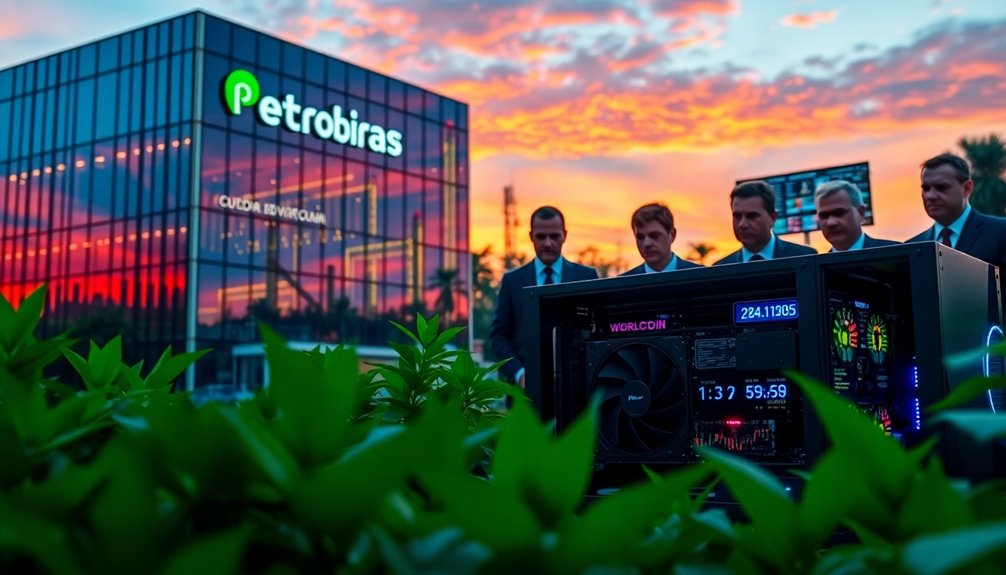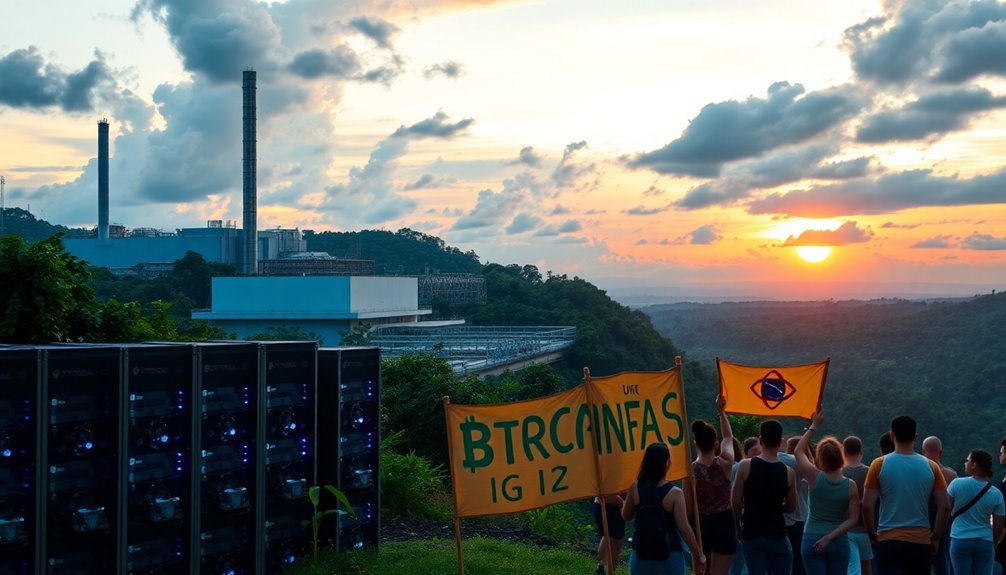Petrobras is embracing Bitcoin mining to diversify its revenue and utilize excess energy, especially from renewable sources. While Brazil examines the operations of digital currencies like Worldcoin, Petrobras aims to set a benchmark for energy companies venturing into the crypto space. This strategic pivot underscores the importance of navigating regulatory challenges to ensure compliance. Curious about how this impacts Brazil's crypto landscape and what it means for the energy sector? There's more to explore on this topic.
Petrobras' Strategic Shift Towards Bitcoin Mining

As Petrobras explores innovative ways to enhance its operations, it's making a strategic shift towards Bitcoin mining, aiming to integrate blockchain technology into its business model. This initiative not only diversifies revenue streams but also reduces reliance on traditional energy markets. By following the lead of industry giants like ExxonMobil and ConocoPhillips, you're positioning Petrobras to remain competitive globally. Moreover, this project involves multiple areas within Petrobras and collaboration with other institutions, which enhances your multidisciplinary approach. However, you'll need to navigate regulatory uncertainties and public perception challenges surrounding Bitcoin mining. Collaborating with institutions like Cenpes and PUC-Rio enhances your multidisciplinary approach. Embracing Bitcoin mining marks Petrobras' entry into the digital asset space, showcasing a commitment to innovation and aligning with broader trends in the energy sector. It's an exciting time for Petrobras!
Leveraging Energy Resources for Sustainable Mining

Petrobras' foray into Bitcoin mining opens up exciting opportunities for leveraging renewable energy resources.
With 54.5% of Bitcoin mining now powered by renewables, you're looking at a significant shift toward sustainability. Additionally, the energy consumption associated with mining influences the choice of hardware and can maximize operational efficiency.
By tapping into hydroelectric power, you can benefit from one of the most cost-effective and stable energy sources available, ensuring high uptime for your operations. Moreover, Petrobras is exploring integration of Bitcoin mining as a potential way to reduce carbon emissions, further enhancing its commitment to sustainable practices.
Plus, Bitcoin mining can utilize excess renewable energy that would otherwise go to waste, enhancing overall energy efficiency. This integration not only reduces carbon emissions but also aligns with global efforts to combat climate change.
Exploring Blockchain Technology Beyond Cryptocurrency

While many associate blockchain technology primarily with cryptocurrency, its applications extend far beyond digital currencies.
In finance, blockchain streamlines transactions, enhances cross-border payments, and supports decentralized finance (DeFi) platforms. Smart contracts automate agreements, boosting transparency and reducing intermediaries.
In supply chain management, blockchain ensures product authenticity, improves logistics, and optimizes inventory management. It even cuts down on counterfeiting. Furthermore, blockchain facilitates transparent tracking of goods, promoting trust among consumers and businesses alike.
Healthcare benefits from secure patient data storage and improved identity verification, while intellectual property protection becomes easier with blockchain.
Moreover, blockchain enhances IoT security, boosts government service efficiency, and helps manage digital rights in media.
The Role of Tokenization in Asset Management

Blockchain's versatility opens the door to innovative concepts like asset tokenization, which transforms traditional assets into digital tokens on a blockchain.
With tokenization, you can convert assets like real estate, art, and company shares into fungible or non-fungible tokens, enhancing liquidity and accessibility. This process allows for fractional ownership, making it easier to trade previously illiquid assets. Furthermore, increased liquidity is a significant benefit that empowers asset owners to access capital more efficiently.
The transparency and security of blockchain ensure a reliable record of ownership, reducing fraud risk. Additionally, tokenization lowers transaction costs by automating processes and minimizing intermediaries.
As the technology advances, asset tokenization has the potential to revolutionize asset management, bringing trillions of dollars in real-world value into the digital realm. Embracing this shift could change how you engage with investments.
Economic Diversification and Revenue Generation

As companies seek new ways to thrive in a rapidly changing market, economic diversification and revenue generation have become crucial strategies.
Petrobras is tapping into Bitcoin mining as a fresh revenue stream, leveraging its excess energy resources. By investing in blockchain technology, the company enhances operational efficiency, which can lead to cost savings. Maximizing oil extraction from existing fields in Brazil also allows Petrobras to support its foray into new ventures while ensuring stable revenue from traditional sources. Additionally, the use of renewable energy sources for Bitcoin mining aligns with global trends toward sustainability.
Partnering with academic and tech institutions supports its digital innovation goals, positioning Petrobras competitively within the energy sector.
With a significant $111 billion investment plan over five years, it aims to expand into low-carbon businesses and logistics.
Such diversification not only mitigates risks tied to oil price fluctuations but also opens doors to new markets, ensuring the company's relevance in an evolving landscape.
Environmental Sustainability: A Key Focus

Petrobras isn't just diversifying its revenue streams; it's also making significant strides in environmental sustainability.
The company's commitment to achieving net zero emissions by 2050 reflects a serious dedication to reducing its carbon footprint. With plans to capture and store 40 million tonnes of CO2 by 2025, Petrobras is positioning itself as a leader in carbon capture and storage. Additionally, their venture into Bitcoin mining aims to utilize excess energy resources, further aligning with their sustainability goals. This initiative also speaks to the broader trend of decentralized finance reshaping traditional banking methods in a more sustainable manner.
Their investment of $1.8 billion in decarbonization initiatives demonstrates a proactive approach. You're likely to notice their focus on biofuels and renewable energy integration, which are crucial for reducing emissions.
Navigating Regulatory Challenges in Brazil

While many companies are eager to dive into the world of Bitcoin mining, navigating Brazil's regulatory landscape can be daunting.
The recently enacted Law No. 14,478/22 establishes a legal framework for virtual assets, with the Brazilian Central Bank overseeing regulations. This means you'll need to prepare for new compliance requirements expected by early 2025. Comprehensive VASP regulation will play a crucial role in shaping the future of crypto operations in the country.
Regulatory uncertainty adds another layer of complexity, as ongoing public consultations may influence final rules. Compliance costs and the need to integrate blockchain technology into your operations also present significant challenges.
Moreover, aligning with international standards is crucial to attract global investors.
Public Perception and Its Impact on Initiatives

Navigating Brazil's regulatory environment isn't the only challenge for companies like Petrobras venturing into Bitcoin mining; public perception plays a significant role too.
Environmental concerns about Bitcoin's energy consumption can sway opinions, but Petrobras aims to tackle this by using renewable energy. Clear communication about these sustainability efforts can enhance public trust and improve their brand reputation. Petrobras' entry into bitcoin mining marks a significant shift into crypto assets, which could further influence how the public perceives their commitment to innovation. The use of renewable energy sources in their operations could also appeal to environmentally conscious investors.
If you see Petrobras compared to traditional industries, like mining or manufacturing, it's crucial to highlight their commitment to eco-friendly practices. Positive public sentiment could lead to increased adoption of their initiatives and regulatory support.
Engaging with stakeholders and providing transparent information can further shape a favorable narrative, ultimately influencing investor confidence and the success of their operations.
Setting a Precedent for the Energy Sector

As Petrobras ventures into Bitcoin mining, it sets a significant precedent for the energy sector, showcasing how traditional energy companies can innovate within the digital landscape.
By leveraging its extensive energy resources, Petrobras plans to utilize excess or renewable energy for mining, enhancing efficiency and reducing costs. This initiative not only aligns with the company's low-carbon transition goals but also explores blockchain applications to improve operational efficiency. Given Brazil's abundant energy resources, Petrobras is well-positioned to lead the way in sustainable Bitcoin mining.
Collaborating with institutions like Cenpes and PUC-Rio, Petrobras aims for a multidisciplinary approach that could inspire other energy companies to adopt similar strategies. Ultimately, this convergence of blockchain and energy could redefine how the sector operates, encouraging innovation and showcasing the potential of renewable resources in the cryptocurrency space.
Brazil's Position in the Global Crypto Landscape

Petrobras' entry into Bitcoin mining illustrates Brazil's broader ambitions in the global cryptocurrency landscape.
With a solid legal framework established for virtual assets, Brazil's Central Bank is poised to regulate the market effectively by 2025. This regulatory clarity has sparked strong market interest, positioning Brazil among the top ten countries for cryptocurrency adoption. Furthermore, the Brazilian Central Bank's regulatory powers have been granted over virtual assets, ensuring a structured approach to the evolving market. New Bitcoin Holders represent a significant shift in demand, which could further enhance Brazil's position in the crypto ecosystem.
Major banks like Itaú Unibanco and Nubank are already offering crypto services, expanding access to millions.
Furthermore, Brazil's involvement in BRICS enhances its role in challenging Western economic dominance.
Frequently Asked Questions
What Specific Technologies Will Petrobras Use for Bitcoin Mining?
Petrobras will likely utilize advanced computing hardware and renewable energy technologies for Bitcoin mining.
You'll see them harnessing associated gas from oil extraction, optimizing energy use while reducing emissions.
Additionally, they may incorporate blockchain applications to streamline operations and enhance transparency.
With substantial research and development efforts, Petrobras aims to establish a robust technological infrastructure, ensuring efficient mining processes that align with their sustainability goals and leverage Brazil's abundant energy resources.
How Will Petrobras Ensure the Security of Its Blockchain Initiatives?
To ensure the security of its blockchain initiatives, you'll need to implement robust encryption techniques and digital signatures to protect data integrity.
Utilizing hash functions will help you detect any alterations, while consensus mechanisms like Proof of Work or Proof of Stake will maintain transaction authenticity.
You should also prioritize regulatory compliance and transparency, engaging with regulatory bodies to clarify legal requirements.
This approach will enhance trust and safeguard your blockchain operations effectively.
What Partnerships Are Essential for Petrobras' Bitcoin Mining Project?
For Petrobras' Bitcoin mining project, you'll find several essential partnerships driving its success.
Collaborating with the Leopoldo Américo Miguez de Mello Research Center enhances R&D capabilities.
Universidade Petrobras and PUC-Rio contribute valuable academic expertise and innovative blockchain solutions.
How Might Bitcoin Mining Impact Petrobras' Existing Operations?
Bitcoin mining could significantly impact your operations by enhancing energy utilization and creating diversified revenue streams.
You'll likely leverage existing infrastructure, improving efficiency and reducing costs.
Additionally, mining can align with your sustainability goals by using renewable energy, helping you mitigate carbon emissions.
This integration may also drive innovation, as you explore blockchain applications, ultimately positioning your company as a leader in the evolving energy landscape while navigating regulatory challenges effectively.
What Are the Potential Risks Associated With Bitcoin Mining for Petrobras?
When considering Bitcoin mining, you've got to weigh several potential risks.
First, the environmental impact could clash with your sustainability goals, especially regarding carbon emissions and resource usage.
Regulatory uncertainty might complicate compliance, making it tricky to navigate evolving laws.
Technological integration poses logistical challenges, as you'll need significant infrastructure.
Lastly, the market volatility of Bitcoin could affect your financial stability, making it essential to develop a solid risk management strategy.
Conclusion
In conclusion, Petrobras' move into Bitcoin mining highlights a significant shift in Brazil's energy landscape. By leveraging sustainable resources and exploring blockchain technology, you can see how this initiative not only diversifies the economy but also generates new revenue streams. However, navigating regulatory challenges and public perception will be crucial for success. As Brazil positions itself in the global crypto scene, you might witness how these developments set a precedent for the energy sector worldwide.









